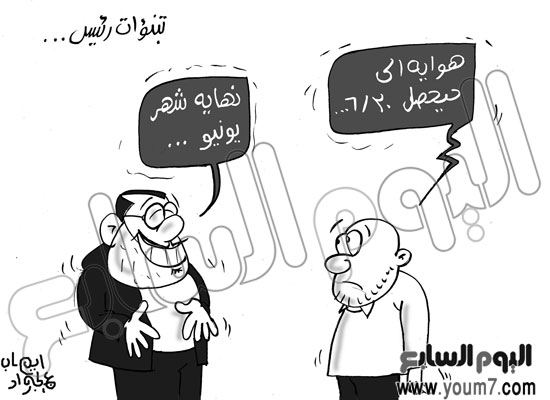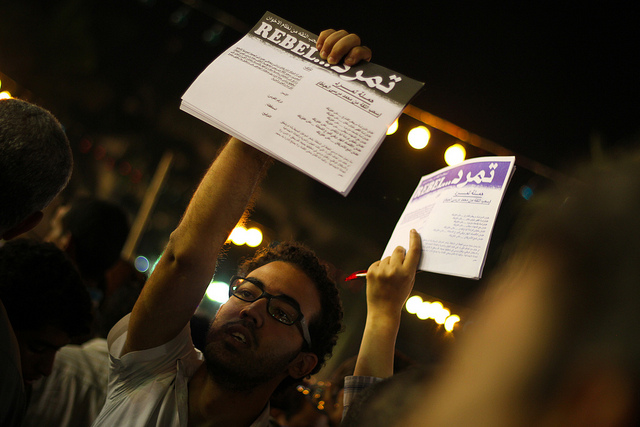
Catch up on the latest out of Egypt every week, with analysis, news updates, photos, videos, and more.
Quotes of the Week
"The new NGO draft law will close the door to Europeans and Americans who want to spread immorality in Egyptian society. NGOs that aim to play in politics or that want to promote liberal Western values– such as the emancipation of women and gay marriage– will be strictly forbidden from operating in Egypt." Adel Afifi, Salafi Asala Party
Egypt in the News
- Egypt’s president appoints seventeen new governors, including seven from MB
- Salafi preacher given eleven-year suspended sentence for blasphemy
- Morsi cuts Egypt’s Syria ties, Syria lashes out at decision
- Interior minister: Islamists should not protest on June 30
- Egypt sends IMF final amendments to its economic program – Minister
- Ethiopia, Egypt tone down talk of war over Nile dam
- Eight governorates say ‘No’ to new governors
- Tamarod reaches fifteen million signatures, says campaign official
- Egypt opposition group criticizes ‘blatant interference’ by US ambassador
- Azhar chief: Opposing rulers is not a sin; Salafi sheikh issues fatwa permitting killing of protesters
- Brotherhood’s FJP condemns violent protests over new Islamist governors
- Catherine Ashton talks Syria, Egypt
- Thousands rally for ‘legitimate’ Morsi in ‘No to Violence’ rally in Cairo
- Presidency considers initiatives to calm political crisis
- US envoy under fire for criticizing Egypt protests
In-depth
Latest blow to Egypt’s tourism: Luxor’s governor | Kristen Chick, Christian Science Monitor
On February 26, 2013, a hot air balloon crashed in Luxor, now known as the ‘deadliest balloon crash in decades.’ Nineteen of the twenty-one passengers died. Now, barely four months later, Luxor has been dealt another blow with a new governor appointment, Adel al-Khayat. Al-Khayat was a former member of the fundamentalist Islamist group, al-Jama’a al-Islamiya, which claimed responsibility for the deadly attack that killed 58 tourists in 1997. The attack took place in Luxor at Deir al-Beheiry. However, the appointment of Khayat as governor has not been well accepted by local residents. Kristen Chick writes of the local reactions to this new appointment and their fears of the effect it will have on tourism in Luxor.
“A crowd gathered outside the office of the new appointee, Adel El Khayat, yesterday, chanting “terrorist" and vowing to prevent him from entering the building. Although he was not personally involved in the attacks, many of the protesters fear that his membership in Al Gamaa al-Islamiyya, which once waged a bloody campaign on tourists and continues to voice disapproval of Western tourism, will scare off foreign visitors.”
“Luxor residents who work in tourism don’t believe that a governor who belongs to such a conservative group will promote tourism or protect monuments that many ultra-conservative groups call un-Islamic.”
On frustration, anger, hope and 30 June | Bassem Sabry, Ahram Online
Bassem Sabry writes of both his concerns for June 30 and the potential results of the Tamarod campaign, the campaign to withdraw confidence from President Mohamed Morsi.
“The language used by people belonging to the anti-Brotherhood and anti-Morsi camp in real life and on social media appears increasingly to be one that is preparing for a defining battle of some sort.”
“But the fact is that the defining stab that brought about this entire debacle and state of affairs was Morsi’s and the Brotherhood’s constitutional declaration in November and the rushing through of the divisive constitution, together with a growing unilateralism, governmental ineptitude, power overreach, lack of transparency, mounting partisanship, and a seeming lack of a sincere willingness to reach a truly deep and non-cosmetic political compromise, and more.”
“Whatever happens on 30 June – for good or ill – Egypt stands in dire need of a profound breakthrough, be it a leadership change through snap presidential elections or a new-found respect for national consensus.”
Videos
Official Tamarod Campaign Video
This Day in History
One year ago, on June 21, 2012, the results of Egypt’s first democratic presidential elections, had still not been released. The last two days of voting were June 17 and 18, leaving days of suspense while the final count was being processed.
“Thousands of protesters filled Cairo’s Tahrir Square overnight as Egypt’s rival presidential candidates, an Islamist and former general, accused each of trying to steal an election whose result is still not known five days after polling ended.” Reuters
“No issue could be more divisive than the presidential vote that pitted the Muslim Brotherhood’s Mohamed Morsy against Ahmed Shafiq, a former military man like Mubarak and briefly the former president’s last prime minister. Both claim victory but the election committee has yet to declare who won as it sifts through allegations of fraud levelled by both sides.” Huffington Post
Cartoon
\
Translation:
Presidential Forecasts:
Person: “What is going to happen on June 30?”
President: “The end of the the month of June.”
Cartoon: Youm7
Photo: Bora S. Kamel
Image: Tamarod_0.jpg
